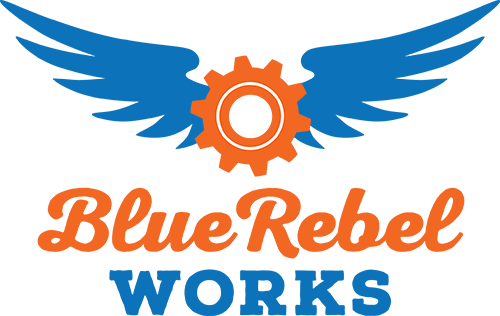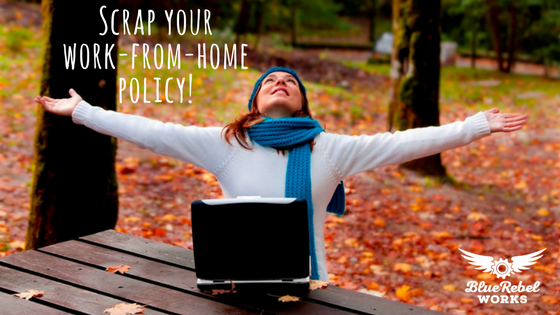I published this post on LinkedIn more than 3 years ago, and it continues to be discussed. I thought I’d share it here, in case you’ve missed it there. I so strongly believe in the concepts discussed here, today just as much (if not more) than I did in 2014. Here’s the post.
I was recently asked by an HR manager if I had a sample of a policy about working from home. My answer was:
Do you want something more than, “get your work done. Meet your objectives. Do that from wherever you want?“
Perhaps I was slightly joking. But really, not so much. I think we often go wrong trying to formalize policies around things that aren’t the important things. Really, does it matter where your employees do their work, as long as they get it done?
Work is not a place you go, but something you do™.
If I work in retail and need to serve customers, I obviously can’t work from home. If my work is done on a certain machine in a factory, then I need to be in the factory to get my work done. But if my work is done on a computer, in the age of the “cloud”, then what difference does it make if I work from home, from a Starbucks, or from the office? What if we just said “get your work done” and let people figure out where and when they can do it best? It takes a reinvention of what we think of as work.
The productivity lie
For years, we have been wrongly focused on time spent at work as a measure of productivity. The thing is, that measure of productivity simply makes no sense. For some reason, managers have a tendency to think others aren’t working unless they can see them… but guess what? Just because your employee is sitting in their seat at their computer does not mean they are being productive.
George Costanza famously demonstrated this on Seinfeld when he locked his keys in his car in the Yankee’s parking lot, making it look like he was the first one in and last one out every day. Check out what he had to say on Seinfeld:
Steinbrenner is like the first guy in, at the crack of dawn. He sees my car, he figures I’m the first guy in. Then, the last person to leave is Wilhelm. He sees my car, he figures I’m burning the midnight oil. Between the two of them, they think I’m working an 18 hour day!
When we focus on time in our seats at work as a measure of productivity, not only are we measuring the wrong thing, we actually spend more time being unproductive ourselves. I recently had a conversation with an HR Manager who was dealing with several issues of bosses disciplining employees because of coming to work late, taking extensive breaks, or leaving early. The amount of energy and time spent on these issues is crippling. And it doesn’t matter!!! I asked my friend “does this person get their work done, even though she takes these breaks?” The answer was yes. So my next question is why are we wasting so much time worrying about her time spent at work, if she’s getting things done?
Most of us are not fabricating widgets or manning a machine on a line. Most of us are knowledge workers, and in today’s world, that means a lot of our work can be done from anywhere. It also often means that we are working or connected to work via smartphones, tablets and laptops for an average of 72 hours a week!
Where do you get your best work done?
Ask yourself this:
Where do I have my most creative thoughts? Where am I when I get my best ideas?
I’m willing to bet that you probably didn’t say “sitting in my cubicle”. I think there are times when it is helpful to be in an office, collaborating in person with team members. I also know that I often get more work done in an hour at home than I could in a full afternoon in an office environment at times. There are other times that I find the music and atmosphere of a coffee shop helpful for some types of work. And I know I get my best ideas when I’m outside in nature or going for a run with my dog. So why do we force people to come to work from 9-5, when they may get more and better work done from elsewhere?
The hard part
OK, so here’s where it gets difficult. Because just saying “work from anywhere” won’t work unless you know what you’re working towards. In an autonomous working world, clear purpose, mission, and goals and objectives are important. We need to get clear on the results we are responsible for, and measure those – not the time spent attempting to achieve them. This is the entire basis of the Results-Only Work Environment, developed by Jody Thompson and Cali Ressler several years ago.
In a ROWE, people manage their own time as well as where and how they work, as long as they get results. This type of work environment shuts down non-productive gossip (which Jody and Cali call “Sludge”) about people leaving early, taking breaks or getting time off because of their family status. In a ROWE, there’s no need for a “work from home” policy, because it doesn’t matter where you work. Managers spend their time as a coach, developing their people, rather than managing the time people spend in their seats at work.
The more I speak with managers about the problems they have with their team members, the more I hear about so much time wasted managing the things that don’t matter – number of sick days, people leaving work early on Fridays, long lunches, too many breaks, and more. Think about it – how much time have you spent in the past month either talking to colleagues about these things, stressing about them as an employee, or managing them as a leader? How much better could this time have been spent if you were simply worried about the outcome of the work – the results people were achieving?
I believe it’s time to stop worrying about where and when people work. It’s time to start thinking about what they accomplish. Who decided that 9-5 was the correct time for work, anyway? Let’s start to question the basic assumptions of work and just focus on being successful for our organizations and our customers. The work world and our lives could be much happier and engaging!
What do you think? Are we wasting too much time worrying about the wrong things? Is it time to reinvent work?
CultureRx® is the owner of the Results-Only Work Environment™ and ROWE™ trademarks, copyrights and other intellectual property which identify the innovative management methodology. No direct or indirect use of the intellectual property, trademarked or copyrighted names, materials or any other aspects of ROWE™ may be used by consultants, or to describe any work environment without express written consent through certification by CultureRx®. Unauthorized use is prohibited.


Recent Comments